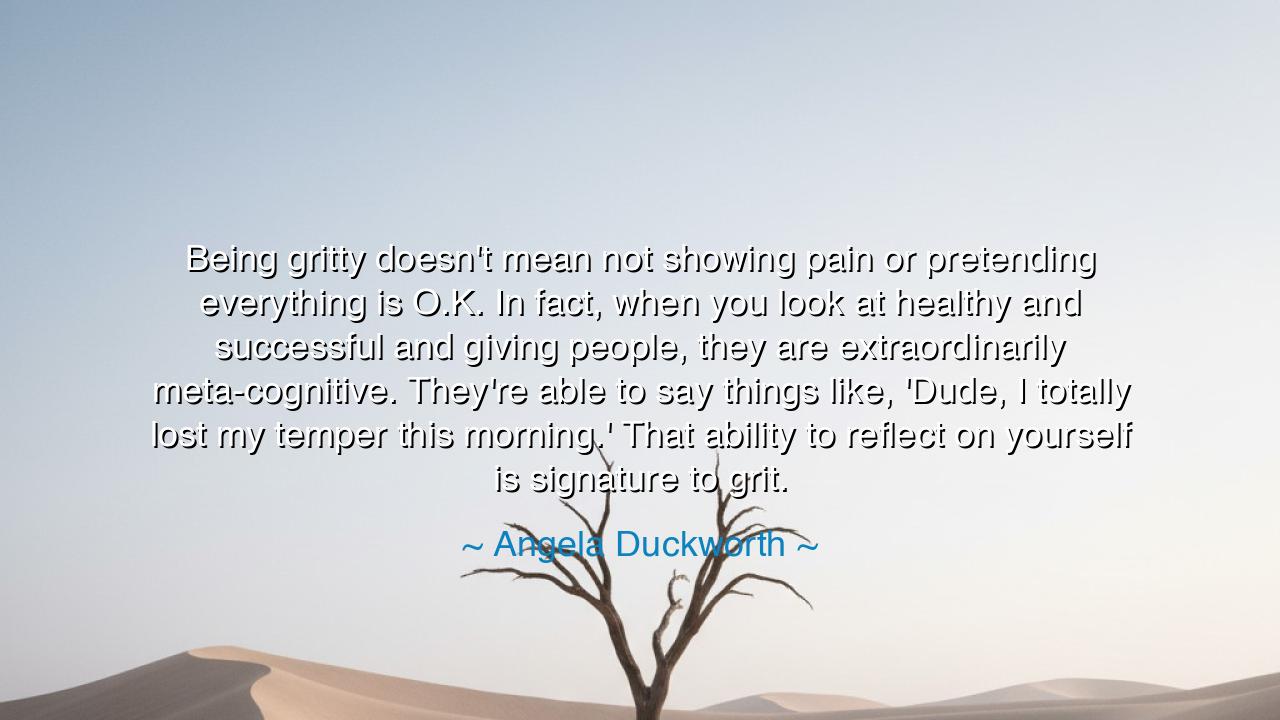
Being gritty doesn't mean not showing pain or pretending
Being gritty doesn't mean not showing pain or pretending everything is O.K. In fact, when you look at healthy and successful and giving people, they are extraordinarily meta-cognitive. They're able to say things like, 'Dude, I totally lost my temper this morning.' That ability to reflect on yourself is signature to grit.






Angela Duckworth, seeker of wisdom and student of the human spirit, once declared: “Being gritty doesn’t mean not showing pain or pretending everything is O.K. In fact, when you look at healthy and successful and giving people, they are extraordinarily meta-cognitive. They’re able to say things like, ‘Dude, I totally lost my temper this morning.’ That ability to reflect on yourself is signature to grit.” These words, though modern in their phrasing, echo the ancient truths of endurance, humility, and self-knowledge. For true strength is not the denial of suffering but the courage to acknowledge it, to study it, and to grow from it.
The origin of this truth lies in the age-old struggle between the mask and the heart. Many believe that to be strong is to harden oneself, to deny pain, to present to the world an unbroken image of control. But this is the way of brittle stone: it resists until it cracks. Duckworth reminds us that true grit is not found in denial but in openness, in the willingness to see oneself clearly. To be meta-cognitive is to rise above one’s own impulses, to gaze at oneself as both actor and observer, and in this gaze, to discover the path to wisdom.
The ancients bore witness to this lesson. Consider the philosopher Socrates, who proclaimed, “The unexamined life is not worth living.” He was not admired for brute strength, nor for denying his human flaws, but for his relentless practice of questioning himself and others. When he faltered, he did not pretend all was well; he confessed ignorance and sought truth. This act of reflection, of admitting error, is what made his spirit enduring. So too with Duckworth’s teaching: it is not perfection that defines grit, but the courage to confess imperfection and to continue striving nonetheless.
There is something deeply heroic in acknowledging one’s pain and mistakes. To say, “I lost my temper,” is not weakness, but proof of strength. For it takes greater courage to reveal the cracks in one’s armor than to pretend the armor is flawless. In this act of honesty, one becomes free to grow, to learn, and to endure longer than the one who hides behind pretense. The warrior who denies his wound risks death; the warrior who admits it finds healing and rises again to fight another day.
The emotional force of Duckworth’s words lies in their defiance of false strength. In our world, many still believe that toughness means silence, that resilience means suppression. But she calls us to a higher form of grit—one that blends humility with perseverance. The truly successful and giving person is not the one who hides their humanity but the one who embraces it, who admits weakness and turns it into a stepping stone toward deeper strength.
The lesson here is timeless: cultivate the discipline of self-reflection. Do not fear the admission of error, for it is the doorway to growth. Do not mask your pain, for to reveal it is to honor your humanity and to open the path to healing. The ancients would remind us that the strongest tree is not the one that resists every storm but the one that bends and endures, learning with each gust of wind.
Practical action follows naturally: begin each day with honesty toward yourself. If you falter, speak it aloud, if only to your own heart: “I failed here. I was weak here. I lost my way here.” Then, rather than despair, use this knowledge as fuel for growth. Speak with humility to those you love, admitting fault and seeking repair. In time, this practice will forge in you a deeper grit than any mask of toughness ever could—a strength not brittle, but unbreakable.
Thus Duckworth’s words ring as a teaching for generations: true grit is not denial, but reflection. It is the art of facing the truth of oneself without fear, and from that truth, rising stronger. Let us pass this wisdom on: be honest, be humble, and be unafraid of your flaws. For in acknowledging them, you step onto the eternal path of growth, and you embody the kind of strength that endures beyond all storms.






AAdministratorAdministrator
Welcome, honored guests. Please leave a comment, we will respond soon